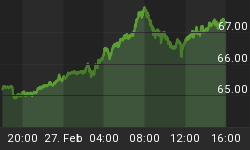The theme this morning in the currency markets is risk aversion as Chinese stocks fell nearly 7% overnight triggering a move into the safety of the U.S. Dollar. Sentiment continues to build that the Chinese government will attempt to curb over capacity in the economy by restricting the practice of reckless lending. Many investors feel the Chinese stock market has surged this year due to the availability of massive capital. The excessive liquidity has encouraged Chinese investors to chase the stock market higher.
In addition to the change in government policy, excessive supply of stock is expected to weigh on prices. A flood of new shares along with a string of IPO's should create an oversupply situation which will push prices lower especially since a drop in liquidity will limit the amount of cash available to chase the market.
U.S. equity markets are expected to open lower in response to the weaker Chinese stock market. The key will be whether the U.S. stock indices follow-through to the downside. Several times this month the stock market has shown signs of weakness on the opening, but each time the break was met with aggressive buying. This type of trading pattern brought selling pressure upon the Dollar.
Since the weaker stock market is the catalyst behind today's strong Dollar, traders should watch equity prices all day for direction. The Dollar is likely to remain firm all day if equity prices go into free-fall mode. A recovery in the equity markets should help weaken the Dollar and could help to erase all of the overnight gains.
The September Japanese Yen is expected to open higher based on the overnight trade. The Yen received a boost after a decisive victory by the country's opposition party during an election over the week-end. Japanese shares dropped following the election and on the weakness in China. These events sent risk adverse Japanese investors scurrying for protection. The repatriation helped support the Yen against higher risk assets.
Stronger than expected Japanese manufacturing activity also helped boost the Yen in addition to better industrial output in July.
Technically the September Japanese Yen took out the July 22nd top at 1.0747 indicating strength. The next upside target is 1.0909. Major uptrending Gann angle support is at 1.0628. This angle is controlling the direction of the market. If it fails to hold, then look for a change in trend to the downside.
The September British Pound is trading weaker overnight despite news that U.K. house prices rose for the first time in two years. This is another sign that the economy is mounting a recovery, but probably not enough to make the Bank of England restrict its quantitative easing program. Trading could be thin today since U.K. markets are closed because of a holiday.
The charts indicate the September British Pound should threaten last week's low at 1.6152. Look for an acceleration to the downside if this price fails as support. The next downside target is 1.5981. The best resistance is a downtrending Gann angle at 1.6323.
Weaker equity markets in Asia, Europe and the U.S. is helping to make traders more risk averse thereby leading to selling pressure on the September Euro overnight. Losses have most likely been limited because of the news that European consumer prices dropped less than economists forecast in August. This news probably solidified the thought that the European Central Bank would not consider applying additional stimulus to the economy.
Technically the September Euro can best be described as range bound. The monthly range is 1.4449 to 1.4045 with a retracement zone at 1.4295 to 1.4247. The shorter-term range is 1.4045 to 1.4409. The retracement zone for this range is 1.4227 to 1.4184. This makes 1.4247 to 1.4227 an important pivot area.
Remember to watch the U.S. equity markets for direction today. A weaker market means a stronger Dollar as money will shift into safer, lower-yielding assets.















